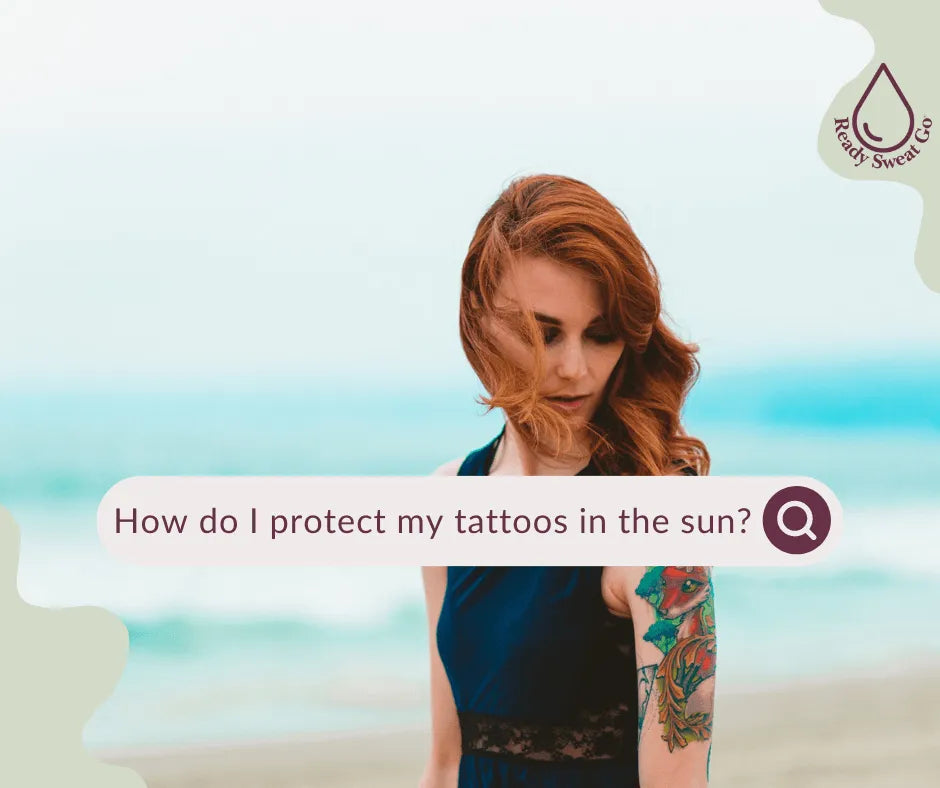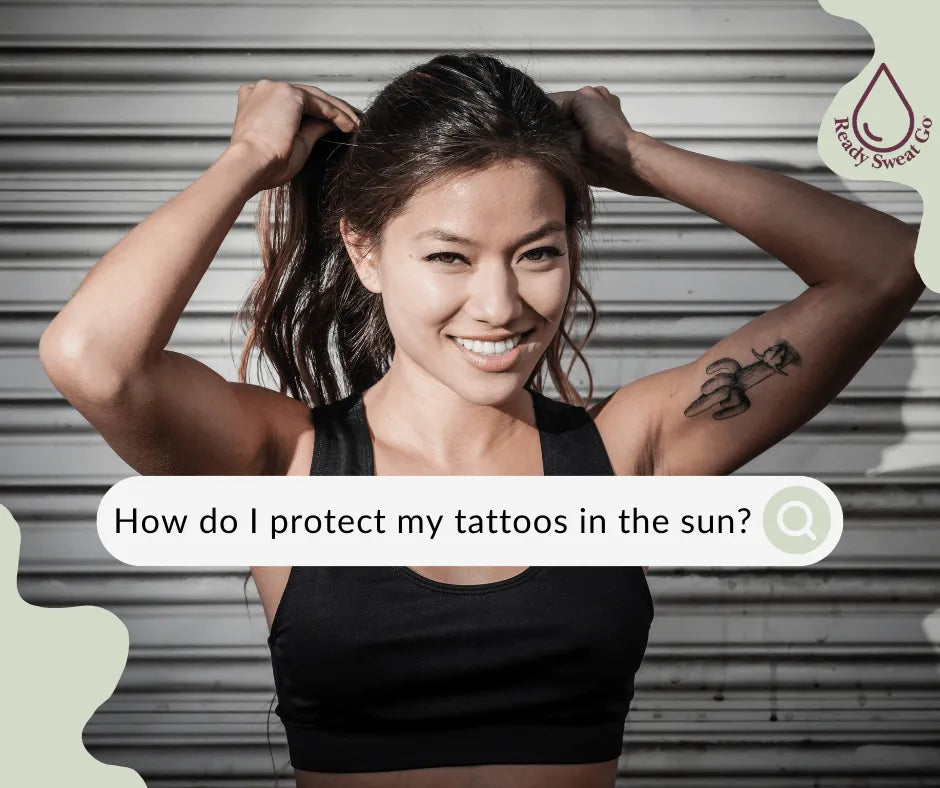Here comes the sun
It’s (hopefully) not being too optimistic to say summer is coming, and a lot of people’s thoughts are already drifting towards summer holidays and long days basking in the sunshine. Who can blame you if you idly daydream about getting a much-needed break?
Whether you have an active summer lined up or you plan nothing more strenuous than casually switching between poolside and bar, you’re likely planning how to make the most of your break, and this manifests itself in many ways.
Right now, some people are:
- Saving money furiously, denying themselves now to ensure they have the best break possible
- Trying to lose weight so they can have a beach ready body (remember, the beach will accept whatever body you turn up with)
- Buying good summer clothes and whether you shop in Primark or Gucci, there is nothing like the crisp feeling of something new on a holiday
- Planning a haircut or whole new look for their trip, and this might include a tattoo
The topic of tattoo sun protection is a hugely important one, and it’s going to be the focus of this article, so if you have tattoos and want to protect them and yourself from too much sun exposure, this is the space for you.
Sun exposure can fade tattoos
Just like the rest of your skin, tattoos are susceptible to the damaging effects of UV rays. Without proper protection, the sun can cause tattoo ink to fade, blur, and even change colour over time. More importantly, unprotected sun exposure can lead to skin damage and increase the risk of developing skin cancer.
By taking simple steps to shield our tattoos from the sun, we can keep them looking vibrant and beautiful for years to come while also prioritising our skin's health.

UV rays can fade and blur tattoos over time
Tattoo ink is particularly vulnerable to the effects of ultraviolet (UV) radiation. When UV rays penetrate the skin, they break down the pigments in ink, causing them to fade and lose their vibrancy over time. This process is known as photodegradation, and it can
affect all tattoo colours, although lighter colours like yellow, pink, and white are more susceptible.
In addition to fading, sun exposure can cause tattoos to blur and lose their sharpness, as the ink particles spread out beneath the skin. The result is a tattoo that looks dull, washed-out, and less defined than it once did.

Tattoo Care
The Ultimate Mineral SunStick
LifeJacket Mineral Stick is compact and made to go anywhere. It offers the maximum mineral based physical barrier to block the suns rays. A perfect way to protect your new tattoo.
One Balm. The only skin repair you'll need.
Green People's Organic One Blam. With 99% Certified organic plant based oils, this healing balm is an ideal way to help restore damaged skin.
SunGel SPF 50+
Easily absorbed, non-greasy sun-gel with an SPF of 50+. Great for larger areas and a perfect way to protect new tattoos for longer periods.
Sun Protection Spray
For hard to reach areas and areas with more hair. Lifejackets SPF 50+ Sun Protection spray is the ideal companion.
Sun exposure can cause skin damage and increase risk of skin cancer
While the aesthetic effects of sun damage on tattoos are concerning, the potential health risks are even more serious. Prolonged sun exposure can cause a range of skin problems, including sunburn, premature aging, and an increased risk of cancer.
Tattoos can make it more difficult to detect the early signs of cancer, as the ink can obscure changes in moles or other skin irregularities. This is particularly worrying for those with large or darkly coloured tattoos, as they may not notice a suspicious spot until it has progressed to a more advanced stage.
Moreover, some studies have suggested that tattoos may increase the skin's sensitivity to UV, making tattooed skin more susceptible to sun damage. This is thought to be due to the way that ink absorbs and scatters UV light, which can lead to increased inflammation and oxidative stress in the surrounding skin cells.
Given the potential risks of sun exposure to both the appearance of tattoos and the health of the skin, it's
clear that sun protection should be a top priority for anyone with tattoos.
By taking proactive steps to shield tattoos from UV, we can help preserve the integrity of our tattoos and reduce the risk of developing cancer and other sun-related damage.

Reapplying sunscreen regularly, especially when sweating or swimming
It's important to reapply sunscreen every 2 hours, or more frequently if you're sweating heavily or swimming. Water, sweat, and friction can all cause sunscreen to rub off or lose its effectiveness over time, so it's crucial to reapply regularly to maintain optimal protection. If you're swimming, opt for a water-resistant sunscreen and use as soon as you get out of the water.
Covering tattoos with clothing or accessories when
possible
In addition to wearing sunscreen, covering your tattoos with protective clothing or accessories can provide an extra layer of defence against UV. Wear long-sleeved shirts, trousers, or rash guards to cover larger tattoos, and consider using UV-protective clothing specially designed for outdoor activities.
For smaller tattoos, you can use bandanas, hats, or even stick-on tattoo covers to shield them from the sun. We interviewed Glasgow Tattoo Artist David Carta to get his thoughts on the subject.
Avoiding prolonged sun exposure, especially during
peak hours
Whenever possible, try to limit your time in direct sunlight, especially during peak UV hours (typically 10 am to 4 pm). If you must be outside during these times, seek shade under trees, umbrellas, or other protective structures.
Remember that even on cloudy or overcast days, harmful sunlight can still penetrate the skin and cause
damage, so it's important to protect your tattoos year-round.

Special considerations for new tattoos
It's exciting when you have fresh tattoos to display, but you must make sure the tattoo heals, and that you apply suitable tattoo sunscreen on that fresh ink!
Importance of following aftercare instructions
When you get a tattoo, it's crucial to follow your tattoo artist's aftercare instructions carefully to ensure proper healing and prevent infection. This typically involves keeping the tattoo clean and moisturised, avoiding direct sunlight, and protecting the tattoo from friction and irritation.
Failing to follow these instructions can lead to complications such as infection, scarring, or delayed healing, which can ultimately affect the appearance of your new tattoo.
When it's safe to apply sunscreen to a new tattoo
During the initial healing process, which usually lasts 2-4 weeks, it's generally not recommended to apply
sunscreen directly to your new tattoo. This is because the tattooed area is essentially an open wound, and applying sunscreen can cause irritation or introduce bacteria that may lead to infection.
Instead, focus on keeping your tattoo covered with loose, breathable clothing or a sterile dressing when you need to be in the sun.
Once your tattoo has finished peeling and appears fully healed, you can begin applying sunscreen to protect it from UV damage. However, it's still a good idea to do a patch test first to ensure that your skin doesn't react negatively to the sunscreen.
Apply a small amount of sunscreen to a discreet area of your tattoo and wait 24 hours to see if any redness or itching occurs. If your skin tolerates the sunscreen well, you can proceed with applying it regularly to your healed tattoo.
Mineral sunscreen offers the best tattoo sun
protection
A mineral sunscreen is an effective tattoo
sunscreen and ensures you use high quality ingredients and avoid chemical formulas when managing the sun's rays. Look for products containing zinc oxide and titanium dioxide when looking for the best tattoo sunscreen.

Tips for protecting a healing tattoo from the sun
While your tattoo is healing, it's best to avoid direct sunlight altogether to prevent UV damage and reduce the risk of fading or discolouration. If you must be in the sun, there are a few steps you can take to protect your healing tattoo:
- Cover the tattoo with loose, breathable clothing that won't rub or irritate the skin.
- Opt for natural, lightweight fabrics like cotton or bamboo.
- If clothing isn't an option, use a sterile, non-stick dressing to cover the tattoo.
- Make sure the dressing is applied loosely to allow the skin to breathe.
- Stay in the shade as much as possible, and avoid spending prolonged periods in sunlight.
- If your tattoo is in an area that's difficult to cover, consider using a UV-protective sleeve or wrap specifically designed for new tattoos that are healing.
Remember, the key to protecting a new tattoo from the sun is to keep it covered and out of the sun until it's fully healed. By taking these precautions, you can help ensure that your tattoo heals properly and maintains its vibrancy for years to come.

Our favourite brands
FAQ's
No. You shouldn't put sunscreen on a new tattoo. And you should try and keep it out of the sun anyway. Especially when new and hasn't healed. This can take upto four weeks for the scab to come off, but a further eight weeks to fully heal underneath.
Well, a lot of people do. So if you do, it's best to avoid the sea, pool and sun! These things can be hard avoided when on holiday. We recommend allowing at least two months to pass before trying any of the above. And when exposing to the sun always use suncream with an SPF of 50+.
Best practice is wear SPF 50+. Wear long-sleeves and trousers where possible. Of course, tattoos can take some sun, but you're better off not taking the risk.
Yes, the sun fades tattoos. In terms of colour, black is the longest lasting, while white, yellow and pink are the first to fade under sunlight. - David Carta, Tattoo Artist
Personally speaking, if you have a new tattoo I wouldn't expose it to the sun for at least two months.
David Carta - Tattoo Artist
Stay in the shade as much as possible and avoid prolonged periods in the sun. Cover the the tattoo with loose, breathable clothing. Lighter non-irritating fabrics are recommended, like cotton or bamboo.
For larger tattoos probably something like an SPF50+ sungel. It's easy to rub in and non-sticky or greasy.
For areas with hair you might want to consider a spray oil, again SPF50+ to ensure your new tattoo is protected.

























